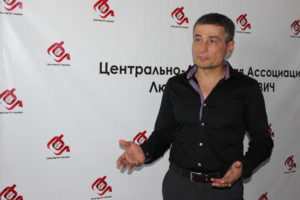
Author: Marina Maksimova, Kazakhstan
From early 2018, HIV rapid testing in Kazakhstan will be available based in the non-governmental organizations (NGOs). With the President of Central Asian Association of People Living with HIV and the ‘Kazakhstan Union of People Living with HIV’ Nurali Amanzholov we are talking about advantages, mechanisms and preparatory work associated with this innovative step in fighting HIV.
– Nurali, it is well known that in Kazakhstan HIV screening test can be conducted at any regional AIDS Center. What is the reason for organizing rapid testing on NGOs’ premises?
– Nowadays, only AIDS Centers are authorized to conduct HIV testing in Kazakhstan. Every regional center has such a department. The problem is that representatives of the key populations (people, who use drugs, sex workers, men who have sex with men) prefer to avoid them. NGOs, using peer-to-peer approach, have better access to these groups, and in such a way there is more confidence. Non-governmental organizations can significantly increase the coverage of those tested for HIV, which means that the control over the epidemic will also increase. Another advantage of the proposed innovation is that it allows to identify HIV infection at an early stage, ensure timely treatment, preserve health and employability, and prevent new cases.
– What are exactly NGOs doing to introduce such service?
– Last year, with the support of the Corporate Foundation Eurasia Foundation of Central Asia, which is supported by the United States Agency for International Development (USAID), Kazakhstan Union of People Living with HIV implemented the project ‘Access to the NGO-based rapid HIV testing in Kazakhstan.’ Its goal is to create an enabling legal environment for providing HIV rapid testing services by NGOs to improve access to this service for key populations. Within the framework of the project, we analyzed the barriers during the introduction of the NGO-based rapid testing. Now we are working on the methodological recommendations and draft of the decree, which should make this initiative legal. It will contain clear operational rules of this system as well as all requirements and methods of control.
– Nurali, what kind of preparatory work is carried out to introduce this NGO-based services next year?
– Today specialists from the Republican Center for AIDS Prevention and Control together with their colleagues from Kazakhstan Union of People Living with HIV provide trainings for NGOs on how to conduct rapid testing in two pilot regions – East Kazakhstan and Pavlodar. We have already conducted trainings for the representatives of four non-governmental organizations. Specialists have taught our staff how to do an HIV rapid testing, and how to conduct pre-test and post-test counseling. They provided information about the quality control of the procedure, safety measures, recycling of consumables, talked about the observance of professional ethics. Each participant knows that if the test results are positive, the patient should be redirected to the AIDS Center for further laboratory diagnosis and confirmation of the HIV status.
– Was your initiative supported by the governmental structures?
– Representatives of the Ministry of Health of the Republic of Kazakhstan, the Republican Center for AIDS Prevention and Control, leading international organizations dealing with HIV in the country are actively involved in this process. There is a good chance to include NGO-based rapid HIV testing into the national testing algorithm, which is being currently reviewed by the Ministry of Health. This will make fundraising efforts of NGOs more efficient, including attracting public funding for these services. This approach insures stability of the services, and of NGOs in general. I am sure that the topic of HIV rapid testing on NGOs’ premises deserves a separate discussion at the 22nd International AIDS Conference AIDS2018 in Amsterdam, and we are ready to share our experience there.



